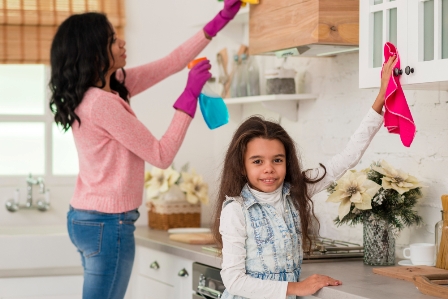In the hustle and bustle of modern life, instilling a sense of responsibility in children is crucial. One effective way to achieve this is by involving them in household chores. Not only does this teach them essential life skills, but it also fosters a sense of contribution and teamwork. In this article, we’ll explore the nuances of cleaning with kids, focusing on strategies to make the experience enjoyable and educational.
Choosing Age-Appropriate Chores
Understanding the developmental stages of children is paramount when assigning household tasks. Younger children may excel at simpler tasks, such as picking up toys, while older ones can handle more complex responsibilities, like setting the table or doing light cleaning.
Creating a Positive Environment
To make chores engaging, it’s essential to create a positive atmosphere. Turning tasks into games, setting challenges, and emphasizing teamwork can transform mundane activities into exciting adventures for kids.
Educational Opportunities Through Chores
Beyond cleanliness, household chores provide unique educational opportunities. Children can develop vital life skills, learn about organization, and grasp the importance of time management through their involvement in routine tasks.
Setting Realistic Expectations
It’s crucial to avoid perfectionism when involving kids in chores. Celebrate effort and improvement rather than focusing solely on the end result. This approach helps build confidence and a positive attitude towards responsibilities.
Safety First
Identifying age-appropriate tasks and teaching safety measures is a non-negotiable aspect of involving children in household chores. This ensures a secure environment and helps kids understand the importance of safety in various settings.
Leading by Example
Parents and guardians play a pivotal role in shaping a child’s attitude towards work. Demonstrating a strong work ethic and displaying enthusiasm for chores sets a powerful example for children to emulate.
Addressing Challenges
Resistance and reluctance are common challenges when introducing kids to chores. Understanding the reasons behind their reluctance and finding collaborative solutions can turn challenges into valuable learning experiences.
Building Consistency
Establishing routines and consistently reinforcing the importance of chores helps create a sense of structure. Consistency instills habits that contribute to a child’s overall development.
Celebrating Achievements
Recognizing and celebrating small achievements is crucial. Whether it’s completing a task independently or showing improvement, positive reinforcement motivates children to actively participate in household responsibilities.
Adapting to Individual Preferences
Each child is unique, with distinct strengths and interests. Tailoring chores to match individual preferences not only makes the tasks more enjoyable but also helps children discover their abilities and interests.
Promoting Independence
Encouraging decision-making and autonomy in completing tasks fosters independence. Allowing children to take charge of specific responsibilities instills a sense of self-sufficiency.
Incorporating Technology
In the digital age, incorporating technology can make chores more engaging. Using apps or tools to create chore schedules, track progress, and manage responsibilities strikes a balance between technology and productive activities.
Long-Term Benefits of Childhood Chores
The impact of involving children in household chores extends beyond their formative years. It molds responsible and capable adults who carry a strong work ethic into various aspects of their lives.
FAQs (Frequently Asked Questions)
It’s advisable to start introducing simple tasks around the age of 2 or 3, gradually increasing complexity as the child grows.
Understand the reasons behind the resistance, communicate openly, and find solutions together. Turning chores into a positive experience can alleviate reluctance.
While occasional rewards can be motivating, it’s crucial to emphasize the intrinsic value of contributing to the household and being part of a team.
Yes, always choose age-appropriate tasks, teach safety measures, and closely supervise when necessary to ensure a secure environment.
Use technology as a tool to streamline chores, create schedules, and track progress. However, maintain a balance to ensure a healthy mix of screen time and physical activities.
Conclusion
Cleaning with kids isn’t just about maintaining a tidy home; it’s a valuable opportunity to instill essential life skills and values. By creating a positive environment, adapting to individual preferences, and promoting independence, parents can turn household chores into meaningful learning experiences for their children.

